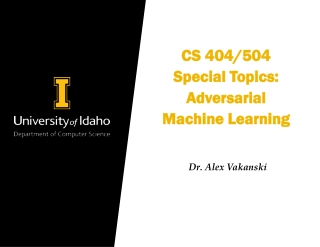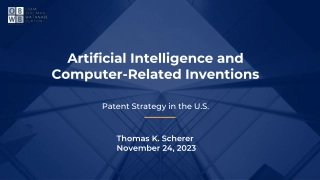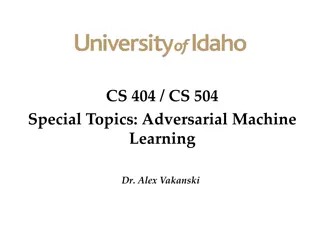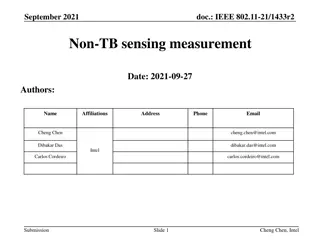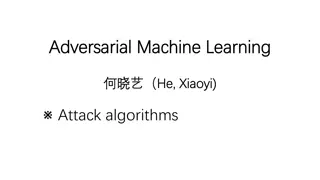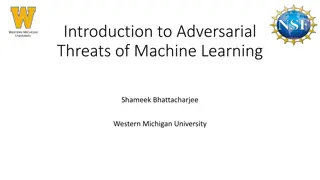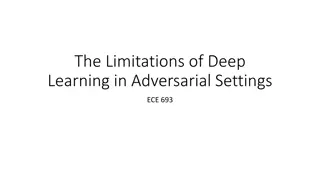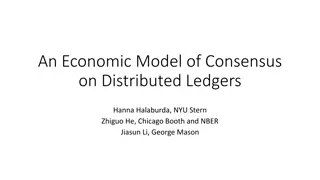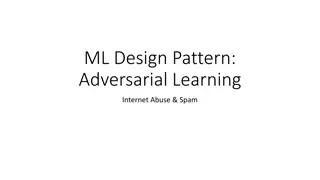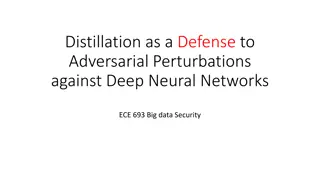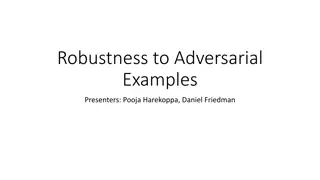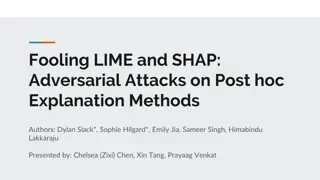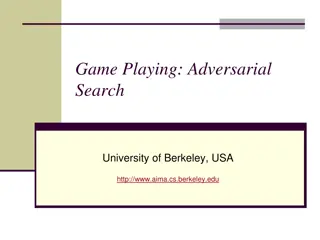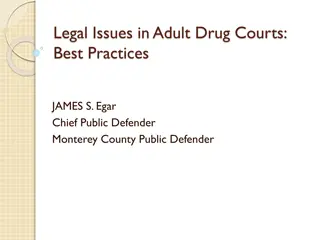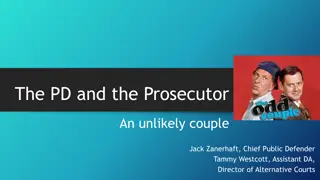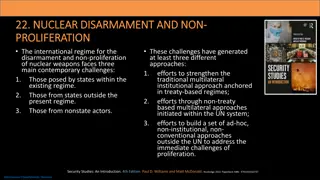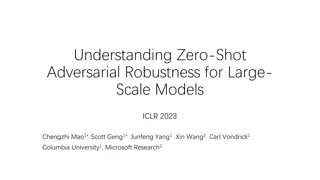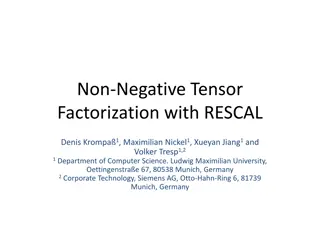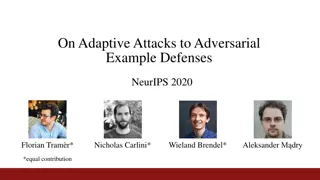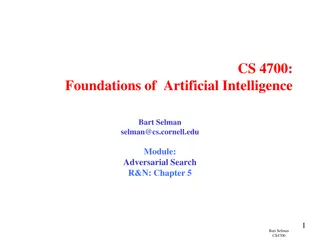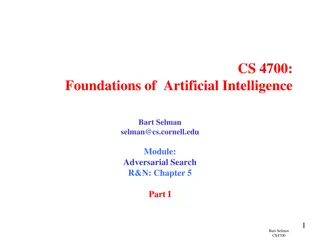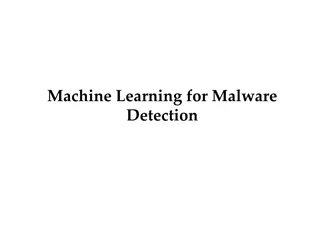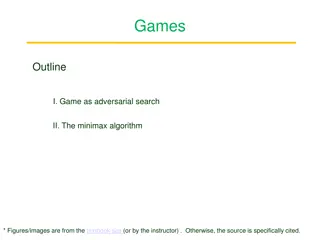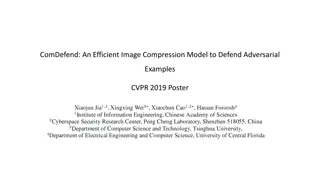Adversarial Machine Learning
Evasion attacks on black-box machine learning models, including query-based attacks, transfer-based attacks, and zero queries attacks. Explore various attack methods and their effectiveness against different defenses.
21 views • 60 slides
Data Augmentation Techniques for Deep Learning-Based Medical Image Analyses
Various data augmentation techniques for improving deep learning-based medical image analyses. It covers topics such as overfitting, data labeling, and the use of generative adversarial networks (GANs).
2 views • 14 slides
Adversarial Machine Learning in Cybersecurity: Challenges and Defenses
Adversarial Machine Learning (AML) plays a crucial role in cybersecurity as security analysts combat continually evolving attack strategies by malicious adversaries. ML models are increasingly utilized to address the complexity of cyber threats, yet they are susceptible to adversarial attacks. Inves
2 views • 46 slides
CS 404/504 Special Topics
Adversarial machine learning techniques in text and audio data involve generating manipulated samples to mislead models. Text attacks often involve word replacements or additions to alter the meaning while maintaining human readability. Various strategies are used to create adversarial text examples
1 views • 57 slides
A Family Safeguarding Approach for Children in Care
Families often come into contact with children's social care due to parenting under adversarial conditions rather than causing harm. The need for a change in vision and values underpinning family safeguarding duties is crucial, emphasizing the importance of helping families raise their children. Lad
1 views • 25 slides
Artificial Intelligence and Computer-Related Inventions
Explore the key concepts and techniques in the field of artificial intelligence (AI), including supervised learning, unsupervised learning, reinforcement learning, deep learning, and generative adversarial networks. Gain insights into the evolving definitions of intelligence in machines and the pote
4 views • 13 slides
Establishing Safety Standards in Non-Movement Areas at Smith Reynolds Airport
This guide outlines the purpose, definitions, rules, and safety measures for operating vehicles in non-movement areas at Smith Reynolds Airport. It emphasizes standardized ground movement practices to ensure the safety of airport patrons, reduce the risk of injury, and maintain a high level of safet
1 views • 12 slides
Exploring Adversarial Machine Learning in Cybersecurity
Adversarial Machine Learning (AML) is a critical aspect of cybersecurity, addressing the complexity of evolving cyber threats. Security analysts and adversaries engage in a perpetual battle, with adversaries constantly innovating to evade defenses. Machine Learning models offer promise in combating
0 views • 43 slides
Understanding Non-Aqueous Solvents: Types and Classification
Inorganic non-aqueous solvents play a crucial role in chemical research and industry. This article by Dr. Princy K.G. delves into the classification of solvents based on protonicity, polarity, and aqueous vs. non-aqueous nature. It explores the types of non-aqueous solvents, such as protonic and non
1 views • 29 slides
Innovative Dispute Resolution Mechanisms: ADR in India
The concept of settling disputes through Alternative Dispute Resolution (ADR) in India introduces non-adversarial mechanisms for resolving legal suits between parties. ADR encompasses negotiation, mediation, arbitration, conciliation, and case evaluation, offering a more collaborative approach to co
0 views • 16 slides
Understanding Non-Firm Quantities in Electricity Markets
Non-Firm Quantities in electricity markets involve units with non-firm access not being compensated for their non-firm capacity not getting accommodated on the system. The concept of Firm Access Quantity plays a key role in determining compensation levels for units, with differences in implementatio
0 views • 6 slides
Understanding Non-Compete Agreements: Enforceability and Requirements
Non-compete agreements are commonly used in the United States to protect businesses from competition by former employees. To be enforceable, these agreements must meet certain requirements, including independent consideration, protection of legitimate business interests, and reasonableness in scope,
0 views • 26 slides
Comparison of Trigger-based vs. Non-Trigger-based Sensing Measurement in IEEE 802.11
The document discusses the differences between Trigger-based (TB) and Non-Trigger-based (Non-TB) sensing measurement instances in IEEE 802.11 standards, focusing on who initiates the sensing measurement. TB sensing is initiated by the AP, while Non-TB sensing is initiated by a non-AP STA, enabling o
6 views • 13 slides
Understanding Adversarial Attacks in Machine Learning
Adversarial attacks in machine learning aim to investigate the robustness and fault tolerance of models, introduced by Aleksander Madry in ICML 2018. This defensive topic contrasts with offensive adversarial examples, which seek to misclassify ML models. Techniques like Deep-Fool are recognized for
0 views • 29 slides
Understanding Adversarial Machine Learning Attacks
Adversarial Machine Learning (AML) involves attacks on machine learning models by manipulating input data to deceive the model into making incorrect predictions. This includes creating adversarial examples, understanding attack algorithms, distance metrics, and optimization problems like L-BFGS. Var
0 views • 88 slides
Understanding Adversarial Threats in Machine Learning
This document explores the world of adversarial threats in machine learning, covering topics such as attack nomenclature, dimensions in adversarial learning, influence dimension, causative and exploratory approaches in attacks, and more. It delves into how adversaries manipulate data or models to co
0 views • 10 slides
Limitations of Deep Learning in Adversarial Settings
Deep learning, particularly deep neural networks (DNNs), has revolutionized machine learning with its high accuracy rates. However, in adversarial settings, adversaries can manipulate DNNs by crafting adversarial samples to force misclassification. Such attacks pose risks in various applications, in
0 views • 38 slides
Adversarial Risk Analysis for Urban Security
Adversarial Risk Analysis for Urban Security is a framework aimed at managing risks from the actions of intelligent adversaries in urban security scenarios. The framework employs a Defend-Attack-Defend model where two intelligent players, a Defender and an Attacker, engage in sequential moves, with
1 views • 26 slides
Economic Models of Consensus on Distributed Ledgers in Blockchain Technology
This study delves into Byzantine Fault Tolerance (BFT) protocols in the realm of distributed ledgers, exploring the complexities of achieving consensus in trusted adversarial environments. The research examines the classic problem in computer science where distributed nodes communicate to reach agre
0 views • 34 slides
Distributed Consensus Models in Blockchain Networks
Economic and technical aspects of Byzantine Fault Tolerance (BFT) protocols for achieving consensus in distributed ledger systems are explored. The discussion delves into the challenges of maintaining trust in adversarial environments and the strategies employed by non-Byzantine nodes to mitigate un
0 views • 34 slides
Adversarial Learning in ML: Combatting Internet Abuse & Spam
Explore the realm of adversarial learning in ML through combating internet abuse and spam. Delve into the motivations of abusers, closed-loop approaches, risks of training on test data, and tactics used by spammers. Understand the challenges and strategies involved in filtering out malicious content
0 views • 13 slides
Distillation as a Defense Against Adversarial Perturbations in Deep Neural Networks
Deep Learning has shown great performance in various machine learning tasks, especially classification. However, adversarial samples can manipulate neural networks into misclassifying inputs, posing serious risks such as autonomous vehicle accidents. Distillation, a training technique, is proposed a
3 views • 31 slides
Understanding Robustness to Adversarial Examples in Machine Learning
Explore the vulnerability of machine learning models to adversarial examples, including speculative explanations and the importance of linear behavior. Learn about fast gradient sign methods, adversarial training of deep networks, and overcoming vulnerabilities. Discover how linear perturbations imp
0 views • 37 slides
Adversarial Attacks on Post-hoc Explanation Methods in Machine Learning
The study explores adversarial attacks on post-hoc explanation methods like LIME and SHAP in machine learning, highlighting the challenges in interpreting and trusting complex ML models. It introduces a framework to mask discriminatory biases in black box classifiers, demonstrating the limitations o
2 views • 18 slides
Understanding Game Playing and Adversarial Search at University of Berkeley
Delve into the realm of game playing and adversarial search at the University of Berkeley to understand the complexities of multi-agent environments. Explore the concepts of competitive MA environments, different kinds of games, and the strategic decision-making processes involved in two-player game
0 views • 81 slides
Best Practices in Adult Drug Courts: Legal Issues & Key Components
Explore the legal aspects and best practices in adult drug courts, including the integration of treatment services with the justice system, ensuring the right to counsel, and the ten key components like identifying participants early, providing access to treatment services, and monitoring abstinence
0 views • 54 slides
Transformative Collaboration in the Criminal Justice System
Embracing a non-adversarial approach, prosecutors and defense attorneys in alternative courts work collaboratively to support defendants through application, assessment, and completion. Prosecutors focus on public safety with a rehabilitative mindset, while defense attorneys prioritize client advoca
0 views • 26 slides
Contemporary Challenges in Nuclear Disarmament and Non-Proliferation Regime
The international regime for nuclear disarmament and non-proliferation faces challenges from states within and outside the regime, as well as non-state actors. Various approaches are being utilized to address these challenges, including strengthening multilateral institutions, non-treaty-based multi
0 views • 12 slides
Understanding Zero-Shot Adversarial Robustness for Large-Scale Models
Pretrained large-scale vision-language models like CLIP show strong generalization on unseen tasks but are vulnerable to imperceptible adversarial perturbations. This work delves into adapting these models for zero-shot transferability in adversarial robustness, even without specific training on unk
0 views • 18 slides
Improving Attainment and Progress of Disadvantaged Pupils in Sheffield
Attainment and progress of disadvantaged pupils in Sheffield show an improving trend across key stages, although the gaps between disadvantaged and non-disadvantaged students are not closing fast enough. Data suggests that disadvantaged pupils with low prior attainment are making better progress in
0 views • 29 slides
Understanding Non-Profit Accounting Essentials
Learn the basics of non-profit accounting, including what defines a non-profit organization, common types of non-profits, governance structures, and legal responsibilities. Discover key insights on IRS and state requirements for non-profits in this informative presentation by Jessica Sayles, CPA fro
0 views • 55 slides
Further Discussion on Non-primary Channel Access in IEEE 802.11
This contribution delves into the utilization of non-primary channels for access in IEEE 802.11 networks, focusing on enhancing frequency reuse, adhering to ETSI standards, evaluating CCA capability types, and analyzing non-ideal deployment scenarios. It discusses the complexity and benefits of non-
0 views • 26 slides
Non-Negative Tensor Factorization with RESCAL
This article discusses non-negative tensor factorization with RESCAL, covering topics such as Non-Negative Matrix Factorization, Multiplicative Updates, RESCAL for Relational Learning, and Non-Negative Constraint for RESCAL. It explores how factorizing matrices/tensors into non-negative factors can
0 views • 11 slides
Evaluating Adaptive Attacks on Adversarial Example Defenses
This content discusses the challenges in properly evaluating defenses against adversarial examples, highlighting the importance of adaptive evaluation methods. While consensus on strong evaluation standards is noted, many defenses are still found to be vulnerable. The work presents 13 case studies o
0 views • 9 slides
Enhancing Academic Integrity: Best Practices for Faculty Engagement
Explore how the Office of the Vice President for Faculty Development and Advancement at FSU supports academic integrity through a non-adversarial process. Learn about resolution options, consulting with instructors, enforcing policy, and conducting allegation discussions with students to foster acco
0 views • 12 slides
Understanding Adversarial Search in Artificial Intelligence
Adversarial search in AI involves making optimal decisions in games through concepts like minimax and pruning. It explores the strategic challenges of game-playing, from deterministic turn-taking to the complexities of multi-agent environments. The history of computer chess and the emergence of huma
0 views • 56 slides
Foundations of Artificial Intelligence: Adversarial Search and Game-Playing
Adversarial reasoning in games, particularly in the context of artificial intelligence, involves making optimal decisions in competitive environments. This module covers concepts such as minimax pruning, game theory, and the history of computer chess. It also explores the challenges in developing AI
0 views • 56 slides
Machine Learning for Cybersecurity Challenges: Addressing Adversarial Attacks and Interpretable Models
In the realm of cybersecurity, the perpetual battle between security analysts and adversaries intensifies with the increasing complexity of cyber attacks. Machine learning (ML) is increasingly utilized to combat these challenges, but vulnerable to adversarial attacks. Investigating defenses against
0 views • 41 slides
Exploring Adversarial Search and Minimax Algorithm in Games
Competitive games create conflict between agents, leading to adversarial search problems. The Minimax algorithm, used to optimize player decisions, plays a key role in analyzing strategies. Studying games offers insights into multiagent environments, economic models, and intellectual engagement. The
0 views • 17 slides
Efficient Image Compression Model to Defend Adversarial Examples
ComDefend presents an innovative approach in the field of computer vision with its efficient image compression model aimed at defending against adversarial examples. By employing an end-to-end image compression model, ComDefend extracts and downscales features to enhance the robustness of neural net
0 views • 16 slides


